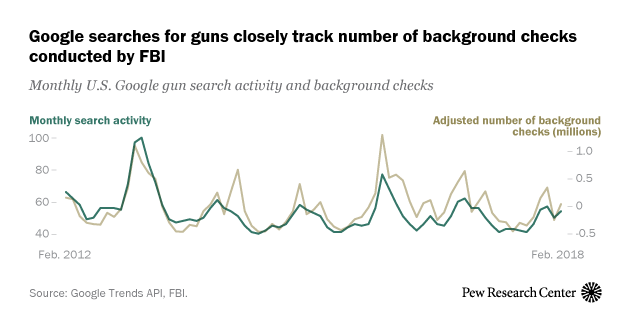 Every year, we publish hundreds of reports, blog posts, digital essays and other studies. Here are some of our most noteworthy findings from the past year.
Every year, we publish hundreds of reports, blog posts, digital essays and other studies. Here are some of our most noteworthy findings from the past year.- 22729Murphy2025-03-20
 Views about the health effects of genetically modified foods grew more negative between 2016 and 2018 and have been steady since then.
Views about the health effects of genetically modified foods grew more negative between 2016 and 2018 and have been steady since then.- 26533Murphy2025-03-20
 COVID-19 may yet do what years of advocacy have failed to: Make telework a benefit available to more than a relative handful of U.S. workers.
COVID-19 may yet do what years of advocacy have failed to: Make telework a benefit available to more than a relative handful of U.S. workers.- 29952Murphy2025-03-20
 Among the changes: Smartphones and social media became the norm, church attendance fell, and same-sex marriage and legalizing marijuana gained support.
Among the changes: Smartphones and social media became the norm, church attendance fell, and same-sex marriage and legalizing marijuana gained support.- 23513Murphy2025-03-20
 Three-in-ten U.S. adults say they have ever used a dating site or app, but this varies significantly by age and sexual orientation.
Three-in-ten U.S. adults say they have ever used a dating site or app, but this varies significantly by age and sexual orientation.- 26763Murphy2025-03-20
 More than half of these social media news consumers say they have encountered made-up news about COVID-19.
More than half of these social media news consumers say they have encountered made-up news about COVID-19.- 27925Murphy2025-03-20
 Americans who closely follow political news are more likely to have confidence that the public will accept election results. And that's true across party boundaries.
Americans who closely follow political news are more likely to have confidence that the public will accept election results. And that's true across party boundaries.- 20556Murphy2025-03-20
 The tech landscape has changed dramatically over the past decade, both in the United States and around the world.
The tech landscape has changed dramatically over the past decade, both in the United States and around the world.- 24112Murphy2025-03-20
 Despite the spread of the conspiracy theories, about three-quarters of U.S. adults say they have heard or read nothing at all about them.
Despite the spread of the conspiracy theories, about three-quarters of U.S. adults say they have heard or read nothing at all about them.- 21810Murphy2025-03-20
 Around three-in-ten Americans living in households earning $75,000 or more a year say they regularly wear a smart watch or fitness tracker.
Around three-in-ten Americans living in households earning $75,000 or more a year say they regularly wear a smart watch or fitness tracker.- 24276Murphy2025-03-20
 Concern is highest among people who follow political news most closely, older adults and those who display more knowledge about politics in general.
Concern is highest among people who follow political news most closely, older adults and those who display more knowledge about politics in general.- 26055Murphy2025-03-20
 The ability to keep personal information from being searchable online is at the crux of the debate around the "right to be forgotten."
The ability to keep personal information from being searchable online is at the crux of the debate around the "right to be forgotten."- 27399Murphy2025-03-20
 The shift has been most notable in jobs that prioritize analytical skills, such as science and math, or fundamental skills, such as writing.
The shift has been most notable in jobs that prioritize analytical skills, such as science and math, or fundamental skills, such as writing.- 24747Murphy2025-03-20
 A majority of Americans are turning to digital means to stay connected and track information about the coronavirus outbreak.
A majority of Americans are turning to digital means to stay connected and track information about the coronavirus outbreak.- 23319Murphy2025-03-20
 Some Americans – particularly those who are younger or college educated – are finding virtual ways to connect, shop and be active.
Some Americans – particularly those who are younger or college educated – are finding virtual ways to connect, shop and be active.- 24101Murphy2025-03-20
 Responses to cable news coverage and the pandemic vary notably among Americans who identify Fox News, MSNBC or CNN as their main source of political news.
Responses to cable news coverage and the pandemic vary notably among Americans who identify Fox News, MSNBC or CNN as their main source of political news.- 20472Murphy2025-03-20
 A median of 77% across 34 countries surveyed use the internet at least occasionally or own an internet-enabled smartphone.
A median of 77% across 34 countries surveyed use the internet at least occasionally or own an internet-enabled smartphone.- 26130Murphy2025-03-20
 The coronavirus outbreak has brought privacy and surveillance concerns to the forefront. Here's what Americans think about those issues.
The coronavirus outbreak has brought privacy and surveillance concerns to the forefront. Here's what Americans think about those issues.- 22015Murphy2025-03-20
 More than half of all tweets sent by members of the U.S. Congress between March 11 and 21 were related to the coronavirus outbreak.
More than half of all tweets sent by members of the U.S. Congress between March 11 and 21 were related to the coronavirus outbreak.- 20400Murphy2025-03-20
 From distractions to jealousy, how Americans navigate cellphones and social media in their romantic relationships.
From distractions to jealousy, how Americans navigate cellphones and social media in their romantic relationships.- 25351Murphy2025-03-20
 Read key findings from an analysis that looks into the public's interest in guns as potential consumer products, rather than as a subject of general interest.
Read key findings from an analysis that looks into the public's interest in guns as potential consumer products, rather than as a subject of general interest. A majority of Americans say they use YouTube and Facebook, while use of Instagram, Snapchat and TikTok is especially common among adults under 30.
A majority of Americans say they use YouTube and Facebook, while use of Instagram, Snapchat and TikTok is especially common among adults under 30.






















